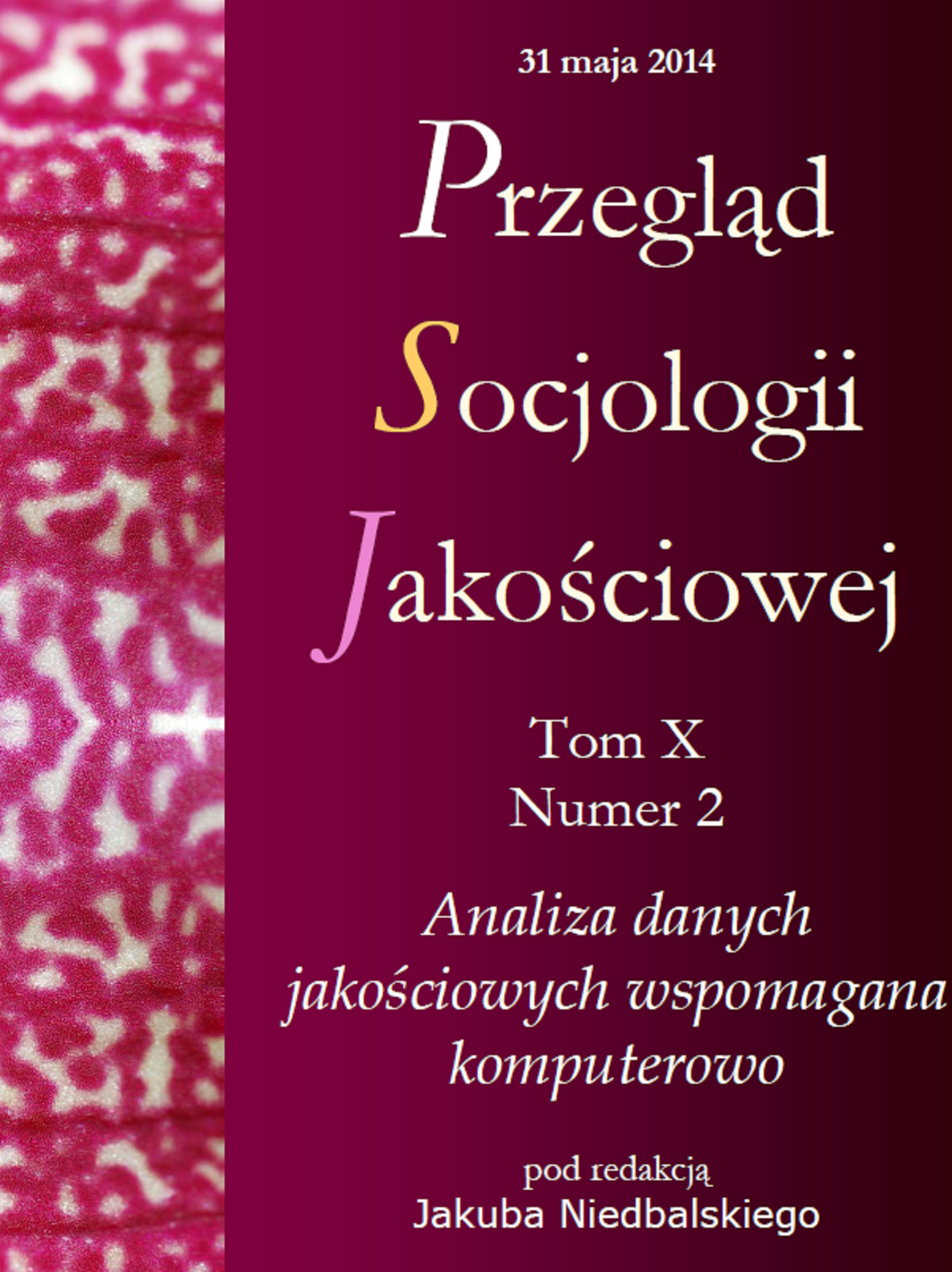Autoetnografia jako technika badań etnograficznych w Internecie
DOI:
https://doi.org/10.18778/1733-8069.10.3.08Słowa kluczowe:
netnografia, cyberetnografia, autoetnografia, etnografia wirtualna, badania jakościowe, cyberkulturaAbstrakt
Już pierwsze etnografie społeczności internetowych realizowały narracyjny model opowieści o osobistym doświadczeniu. Dziś to podejście nadal reprezentuje wielu badaczy cyberkultury, coraz częściej uprawiających autoetnografię metodologicznie świadomą i intencjonalnie wpisaną w korpus technik etnograficznych. Artykuł przedstawia charakterystykę, historię i dorobek tak rozumianej autoetnografii Internetu – umocowanej teoretycznie i metodologicznie w tradycji jakościowych badań społecznych, poszukującej równowagi między emic i etic w narracyjnej warstwie tekstu etnograficznego i stawiającej w centrum swojego zainteresowania relację pomiędzy podmiotem a przedmiotem badania.
Pobrania
Bibliografia
Anderson Leon (2006) Analytic Autoethnography. „Journal of Contemporary Ethnography”, vol. 35, no. 4, s. 373–395.
Google Scholar
DOI: https://doi.org/10.1177/0891241605280449
Banks Michael A. (2008) On the Way to the Web. The Secret History of the Internet and Its Founders. Berkeley: Apress.
Google Scholar
Bielecka-Prus Joanna (2013) Po co nam autoetnografia? Krytyczna analiza autoetnografii jako metody badawczej. Referat zaprezentowany podczas Ogólnopolskiego Zjazdu Socjologicznego Polskiego Towarzystwa Socjologicznego, 11–14 września 2013, Szczecin, Polska.
Google Scholar
Boellstorff Tom (2008/2012) Dojrzewanie w Second Life. Antropologia człowieka wirtualnego. Przełożyła Agata Sadza. Kraków: Wydawnictwo Uniwersytetu Jagiellońskiego.
Google Scholar
Brockmeier Jens (2000) Autobiographical Time. „Narrative Inquiry”, vol. 10, no. 1, s. 51–73.
Google Scholar
DOI: https://doi.org/10.1075/ni.10.1.03bro
Castells Manuel (1996) The Rise of the Network Society, The Information Age: Economy, Society and Culture. Vol. 1. Cambridge, Oxford: Blackwell.
Google Scholar
Castells Manuel (1997) The Power of Identity, The Information Age: Economy, Society and Culture. Vol. 2. Cambridge, Oxford: Blackwell.
Google Scholar
Castells Manuel (1998) End of Millennium, The Information Age: Economy, Society and Culture. Vol. 3. Cambridge, Oxford: Blackwell.
Google Scholar
Day Graham (2006) Community in Everyday Life. London, New York: Routledge.
Google Scholar
DOI: https://doi.org/10.4324/9780203463178
Ellis Carolyn (2004) The Ethnographic I: A Methodological Novel About Autoethnography. Walnut Creek: AltaMira.
Google Scholar
Ellis Carolyn, Bochner Art P. (2006) Analyzing Analytical Autoethnography. „Journal of Contemporary Ethnography”, vol. 35, no. 4, s. 429–449.
Google Scholar
DOI: https://doi.org/10.1177/0891241606286979
Flichy Patrice (2007) The Internet Imaginaire. Translated by Liz Carey-Libbrecht. Cambridge: The MIT Press.
Google Scholar
Hayano David M. (1979) Auto-ethnography: Paradigms, Problems, and Prospects. „Human Organization”, vol. 38, no. 1, s. 99–104.
Google Scholar
DOI: https://doi.org/10.17730/humo.38.1.u761n5601t4g318v
Hernández Fernando i in. (2010) Becoming University Scholars: Inside Professional Autoethnographies. „Journal of Research Practice”, vol. 6, no. 1, article M7 [dostęp 30 listopada 2013 r.]. Dostępny w Internecie http://jrp.icaap.org/index.php/jrp/article/view/204/188
Google Scholar
Hine Christine (2000) Virtual Ethnography. London: Sage.
Google Scholar
DOI: https://doi.org/10.4135/9780857020277
Holt Nicholas L. (2003) Representation, Legitimation, and Autoethnography: An Autoethnographic Writing Story. „International Journal of Qualitative Methods”, vol. 2, no. 1, Article 2 [dostęp 30 listopada 2013 r.]. Dostępny w Internecie http://www.ualberta.ca/~iiqm/backissues/2_1final/html/holt.html
Google Scholar
DOI: https://doi.org/10.1177/160940690300200102
Jemielniak Dariusz (2012) Życie wirtualnych dzikich. Netnografia Wikipedii, największego projektu współtworzonego przez ludzi. Warszawa: Wydawnictwo Poltext.
Google Scholar
Jemielniak Dariusz (2013) Netnografia, czyli etnografia wirtualna – nowa forma badań etnograficznych. „Prakseologia”, nr 154, s. 87–119.
Google Scholar
Kozinets Robert V. (2010/2012) Netnografia. Badania etnograficzne online. Przełożyła Maja Brzozowska-Brywczyńska. Warszawa: Państwowe Wydawnictwo Naukowe.
Google Scholar
Maréchal Garance (2010) Autoethnography [w:] Albert J. Mills, Gabrielle Durepos, Elden Wiebe, eds., Encyclopedia of Case Study Research, vol. 2. Thousand Oaks: Sage Publications, s. 43–45 [dostęp 30 listopada 2013 r.]. Dostępny w Internecie http://www.academia.edu/843133/Autoethnography
Google Scholar
Miner Horace (1956/1999) Rytuały cielesne wśród Nacirema [w:] Michał Buchowski, red., Amerykańska antropologia postmodernistyczna. Przełożyła Joanna Minksztym. Warszawa: Wydawnictwo Instytutu Kultury, s. 31–37.
Google Scholar
Ngunjiri Faith Wambura, Hernandez Kathy-Ann C., Chang Heewon (2010) Living Autoethnography: Connecting Life and Research. „Journal of Research Practice”, vol. 6, no. 1, article E1 [dostęp 30 listopada 2013 r.]. Dostępny w Internecie http://jrp.icaap.org/index.php/jrp/article/view/241/186
Google Scholar
Oldenburg Ray (1989) The Great Good Place: Cafes, Coffee Shops, Community Centers, Beauty Parlors, General Stores, Bars, Hangouts, and How They Get You Through the Day. New York: Paragon House.
Google Scholar
Oldenburg Ray (1991) The Great Good Place. New York: Marlowe & Company.
Google Scholar
Oldenburg Ray (2000) Celebrating the Third Place: Inspiring Stories About the “Great Good Places” at the Heart of Our Communities. New York: Marlowe & Company.
Google Scholar
Reed-Danahay Deborah E. (1997) Introduction [w:] Deborah Reed-Danahay, ed., Auto/Ethnography: Rewriting the Self and the Social. Oxford: Berg, s. 1–17.
Google Scholar
DOI: https://doi.org/10.4324/9781003136118-1
Rheingold Howard (1993) The Virtual Community. Homesteading on the Electronic Frontier [dostęp 30 listopada 2013 r.]. Dostępny w Internecie http://www.rheingold.com/vc/book/
Google Scholar
Rheingold Howard (2003) Smart Mobs. The Next Social Revolution. Cambridge: Parsons Publishing.
Google Scholar
DOI: https://doi.org/10.3917/soc.079.0075
Teli Maurizio, Pisanu Francesco, Hakken David (2007) The Internet as a Library-of-People: For a Cyberethnography of Online Groups. „Forum Qualitative Sozialforschung/Forum: Qualitative Social Research”, vol. 8, no. 3, art. 33 [dostęp 30 listopada 2013 r.]. Dostępny w Internecie http://nbn-resolving.de/urn:nbn:de:0114-fqs0703338
Google Scholar
Tierney William G. (1998) Life History’s History: Subjects Foretold. „Qualitative Inquiry”, vol. 4, s. 49–70.
Google Scholar
DOI: https://doi.org/10.1177/107780049800400104
Wall Sarah (2006) An Autoethnography on Learning About Ethnography. „International Journal of Qualitative Methods”, vol. 5, no. 2, art. 9 [dostęp 30 listopada 2013 r.]. Dostępny w Internecie http://www.ualberta.ca/~ijqm/backissues/5_2/pdf/wall.pdf
Google Scholar
DOI: https://doi.org/10.1177/160940690600500205
Wesołowski Jacek (2002) Klasyfikacja gatunkowa trolli sieciowych, dokonana na podstawie obserwacji grup dyskusyjnych w hierarchii pl, pierwotnie opublikowana na grupie pl.rec.gry.komputerowe [dostęp 30 listopada 2013 r.]. Dostępny w Internecie http://niusy.onet.pl/niusy.html?t=artykul&group=pl.rec.gry.komputerowe&aid=21009606
Google Scholar
Pobrania
Opublikowane
Jak cytować
Numer
Dział
Licencja

Utwór dostępny jest na licencji Creative Commons Uznanie autorstwa – Użycie niekomercyjne – Bez utworów zależnych 4.0 Międzynarodowe.














